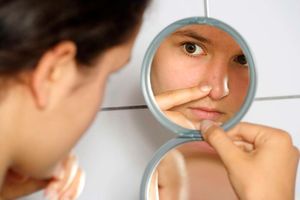What risks are you exposing your skin to when you don’t use sunscreen?

By wearing sunscreen, you are promoting overall well-being for your body.
What you need to know:
- Using sunscreen promotes a healthy lifestyle because it reduces your chances of developing skin cancer, getting wrinkles and sunburns, and keeps your body looking even-toned.
- Sunscreen protects against harmful UV radiation. Add it to your daily skincare routine for the best results.
Whether at the beach or in your backyard enjoying a sunny day, it is important to take care of your skin and protect yourself against harmful UV rays.
What is sunscreen?
Sunscreen is a product worn on the skin to block the sun's ultraviolet (UV) rays. It comes in different forms, including sprays, lotions, creams, and sticks.
A sunscreen's ability to protect against UV is tied to its ability to screen out specific wavelengths of light called "broad spectrum." Broad-spectrum means that it blocks both UVA and UVB radiation. Unfortunately, many sunscreens do not provide broad-spectrum protection. Be sure to read the label or check the SPF level.
Sunscreen should be applied 15-30 minutes before exposure to the sun to allow the ingredients time to bind with the skin and absorb into the outer layer of cells.
The Benefits of Using Sunscreen
Reduces the risks of skin cancer
Sunscreens are preventative products designed to be applied before exposure to UV rays. Melanoma is a type of skin cancer that is caused by prolonged exposure to UV radiation. If you are exposed to UV rays without protection, the effects of this exposure can lead to melanoma.
Sunscreen has antiaging properties
UV radiation can cause a breakdown in collagen and elastin, which are proteins that help the skin stay firm. As time progresses, damage to these proteins leads to an accelerated aging process on the deeper layers of your skin. Using sunscreen helps reduce the risk factors for damaged or wrinkled-looking skin.
Shields the skin from sunburns
Sunscreen helps prevent sunburns. Sunburns are caused by prolonged unprotected exposure to the sun's UV rays. A severe blistering burn can lead to peeling of your skin and possible infections that could require medical attention.
You reduce your risk of this happening by using sunscreen before being exposed to UV rays.
Sunscreen gives the skin an even tone and glow
Sunscreen helps protect against tanning, which gives your body its colour in response to UV exposure. However, when the damage accumulates over time, it leads to dark spots or uneven areas of skin that look like patches, because of the difference between where you've been exposed to UV rays and where you haven't.
Using sunscreen before being exposed to UV rays prevents this from happening because your skin is protected against the harmful effects of UV radiation.
Sunscreen promotes a healthy skin lifestyle
By wearing sunscreen, you are promoting overall well-being for your body. In addition, you are protecting yourself against harmful UV radiation that can lead to melanoma, wrinkles, and sunburns. Collagen damage is prevented with sunscreen, leading to nourished, firm skin.
Who should use sunscreen?
It can be used on people of all skin types, including those who are sensitive to the sun's rays. For kids aged 6 months and above, it is essential to protect their skin from harmful UV radiation. For adults, it is even more crucial since they are exposed to the sun for more extended periods throughout the day.




